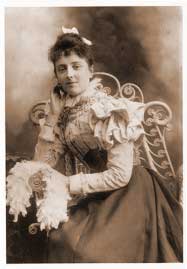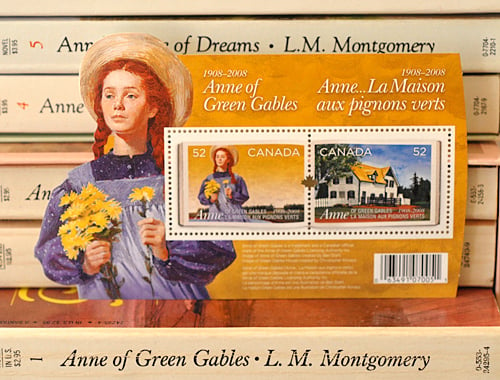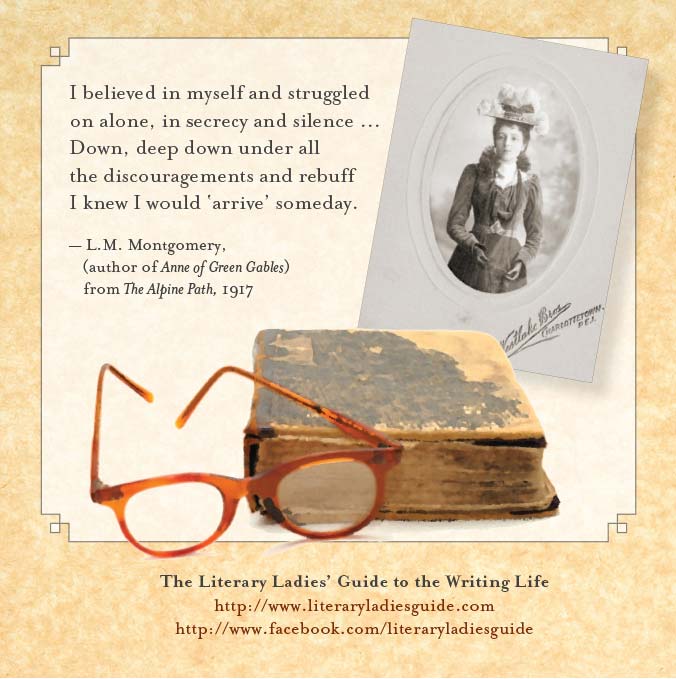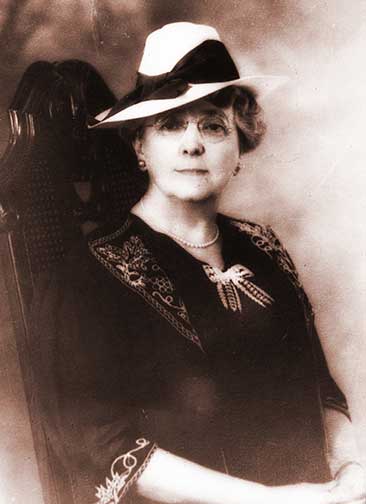L.M. Montgomery on Her Writing Life
By Nava Atlas | On July 24, 2017 | Updated January 4, 2019 | Comments (5)

From her sunny characters, notably Anne Shirley (of Anne of Green Gables) and happy plots, you’d think that L.M. Montgomery (1874 – 1942) was reflecting on an idyllic life. But writing was something that served as a pleasurable escape, especially as she grew older.
She struggled with severe bouts of depression, and was the primary caregiver to her husband, whose mental illnesses eventually incapacitated him.
Montgomery, known to her familiars as Maud, wove her personal experiences with marriage and motherhood into her work.
Fiction became a buffer against resentment at the roles she maintained, first as a dutiful granddaughter, then as an upstanding minister’s wife and devoted mother.
Though these weren’t entirely facades, her spirited female characters hint at rebellion, and a longing for freedom and greater opportunities. As a writer, she experienced the gamut, from lots of rejection, to being cheated by her publisher, to great success and fame within her lifetime.
. . . . . . . . . . .

Dear Literary Ladies:
Do You Learn Anything From the Reviews of Your Books?
. . . . . . . . . . .
Writing in the midst of chaos
Maud Montgomery always found a way to write, because she felt compelled. Here she writes about how she slipped in time to write while working a job as a young woman:
“… Now, it used to be at home, that I thought undisturbed solitude was necessary that the fire of genius might burn. I must be alone and the room must be quiet. It would have been the last thing to enter my imagination to supposed that I could ever write anything at all, much less anything of value, in a newspaper office, with rolls of proof shooting down every few minutes, people coming and going and conversing, telephones ringing and machines thumping and dragging overhead. I would have laughed at the idea — yea, I would have laughed it to scorn.
But the impossible has happened … Every morning here I write and not bad stuff either. I have grown accustomed to stopping in the midst of a paragraph to interview a prowling caller and to pausing in full career after an elusive rhyme to read a batch of proof and snarled-up copy.
It’s all in a days’ work … it’s trying. However, it has to be done and I won’t grumble, not one little bit!” (From her journal, entry dated January, 1910)
. . . . . . . . . . .

How L.M. Montgomery Found a Publisher for Anne of Green Gables
. . . . . . . . . . .
Challenges with mental health
As the years went on, Maud Montgomery’s mental health deteriorated — she battled mightily with depression — and her personal life was fraught with family challenges. Her husband’s mental state eclipsed her own. At the same time, her novels and stories became ever more mature and complex, and her following continued to grow. She knew how to keep her fans happy in a way that she couldn’t do for herself or her family.
One can only marvel that a mother, wife, and writer who so often confessed such sentiments to her journal as “I have just spent two days in hell,” could keep the flame of creation burning so brightly, and so constantly.
“I will succeed”
At first, Maud Montgomery met with nothing but rejection. But she was determined not to give up:
“At first I used to feel dreadfully hurt when a story or poem over which I had laboured and agonized came back, with one of those icy little rejection slips … But after a while I got hardened to it and did not mind. I only set my teeth and said, “I will succeed.”
I believe in myself and I struggled on alone, in secrecy and silence. I never told my ambitions and efforts and failures to any one. Down, deep down, under all discouragements and rebuff I know I would “arrive” some day.” (The Alpine Path, 1917)
. . . . . . . . . . . .
. . . . . . . . . . . .
Writing what the public demands
Privately, Maud expressed ambivalence about continuing to write books starring Anne Shirley. But she kept these thoughts between herself, her journals, and a very select group closest to her:
“I am now girding up the loins to begin a third ‘Anne’ book. This is to be written to satisfy my publisher and public, not myself. I am very reluctant to begin it. It seems so hard to get back into the atmosphere of Anne—like putting on a dress worn years ago, which, no matter how beautiful still, is something I have outgrown and find out of fashion with my later development …
I fear that I must henceforth be a slave to the style that the public have learned to expect from me. They will not tolerate a change. And I should like to try my hand at a different type of book. Someday I shall—when I have made enough money to be independent of the public taste. (from a letter, 1906)
. . . . . . . . . . . .
. . . . . . . . . . .
Years of struggle vindicated
No matter what was going on in her personal life, Maud wanted her writing to bring joy to readers. Here she reflects on the glowing reviews for one of the Anne sequels:
“One of the reviews says ‘The book radiates happiness and optimism.’ When I think of the conditions of worry and gloom and care under which it was written I wonder at this … I would not wish to darken any other life — I want instead to be a messenger of optimism and sunshine …
It is a joy to feel that my long years of struggle and unaided effort have been crowned with success.” (from her journal, 1910)
Money is nice, but can’t buy happiness
Maud earned a handsome living from her books, but it didn’t necessarily make her happier or her life easier. In addition, she had been embroiled in a suit with her publisher, believing that they had cheated her:
“Last night I sat down and computed the number of dollars I have made by my pen since that day in Halifax twenty-five years ago when I got my first check — five dollars for a story. The result totals up to about one hundred thousand dollars. Not such a bad total, considering the equipment I started out with — my pen and a knack of expression.
If Pages [her publisher] had not been rogues I should have had at least fifty thousand more. But it’s no so bad. It’s a pity it doesn’t mean happiness.
But perhaps my children will reap the happiness from it that I cannot have. And perhaps they would be better off, and more ambitious and successful if they had to scramble along and struggle as I did. That seems often to be the way in this mad world.” (From her journal, entry dated February, 1921)


I greatly admire such a wonderful writer. It is very sad to think that what she wrote didn’t always bring her the amount of joy it did to others. But I am grateful for her sacrifice, as I adore the Anne of Green Gables series.
She was really a remarkable person.
Thank you for your comment, Mags. She really was remarkable. We recently posted an interview with Logan Steiner, whose recent novel about L.M. Montgomery and her complicated life is quite fascinating: https://www.literaryladiesguide.com/literary-musings/q-a-logan-steiner-author-of-after-anne/
I greatly admire such a wonderful writer. It is very sad to think that what she wrote didn’t always bring her the amount of joy it did to others. But I am grateful for her sacrifice, as I adore the Anne of Green Gables series.
I love Anne of Green Gables and am sorry to hear that Miss Montgomery had a life full of trials.
Yes, it was a lifelong battle with depression, but she really wanted to make her readers happy.